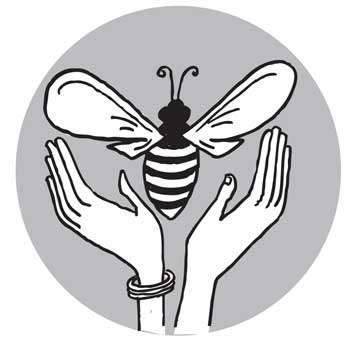Reply To:
Name - Reply Comment
Last Updated : 2024-04-19 00:10:00
Many people especially those not too concerned about environmental issues and the vital need to maintain bio-diversity may be surprised that tomorrow is World Bee Day. But the United Nations itself has declared this day on its calendar on the basis that bees and other pollinators, such as butterflies, bats and hummingbirds, are increasingly under threat from selfish human activities.

According to the UN, which is playing a vital role in the battle against climate change, destruction of the bio-diversity or eco-balance; pollinators allow many plants, including many food crops, to reproduce. Not only do pollinators contribute directly to food security, but they are key to conserving biodiversity -- a cornerstone of the Sustainable Development Goals. They also serve as sentinels for emergent environmental risks, signalling the health of local ecosystems. Thus we see the importance of World Bee Day and know that we need to think beyond the nursery rhymes like “one two three, bumble bee...”
Invasive insects, pesticides, land-use change and mono-cropping practices may reduce available nutrients and pose threats to bee colonies. To raise awareness of the importance of pollinators, the threats they face and their contribution to sustainable development, the UN designated May 20 as World Bee Day.
You may ask why this day? May 20 coincides with the birthday of Anton Janša, who in the 18th century pioneered modern beekeeping techniques in his native Slovenia and praised the bees for their ability to work so hard, while needing so little attention.
The UN Food and Agriculture Organisation (FAO) portrays a graphic picture of the world’s different pollinators, species such as butterflies, birds and bats. The most popular are bees and it is estimated that there are between 25,000 and 30,000 species. We could ask why we need to care about pollinators if we were eco-friendly and responsible citizens instead of just being carried away by the false and impermanent values of a selfish and wicked world.
We need to know that globally some 90 per cent of wild flowering plants depend on animal pollination for producing their seed. Therefore pollinators are responsible for 35 per cent of the world’s crop production. So this shows that caring for bees and other pollinators is part of the fight against world hunger. According to the FAO’s latest report some 124 million people in 51 countries experienced high levels of food insecurity last year -- 11 million more people than the year before. According to the latest edition of the Global Report on the Food Crises, hunger is so severe it poses an immediate threat to lives or livelihoods.
The increase is largely attributable to new or intensified conflict and insecurity in Myanmar, north-east Nigeria, the Democratic Republic of Congo, South Sudan and Yemen. Prolonged drought conditions also resulted in consecutive poor harvests in countries already facing high levels of food insecurity and malnutrition in eastern and southern Africa.
That is why the FAO says ensuring biodiversity among these species is crucial to build resilience in agro-ecosystems and adapt to climate change.
In Sri Lanka we regularly hear of attacks by bees but according to Bandara Thambavita, Secretary of the Kandy-based Bee-Protection Organization, last year a bee disease had hit Colombo and Gampaha.
Mr. Thambavita said ‘Apis cerana indica’ or the Indian honey bee is the honey bee mainly found in Sri Lanka. It is generally considered a robust species, quite resistant to diseases compared to the ‘Apis mellifera’, its Western cousin.
He told the media most of the diseases bees contracted up until recently could be controlled by natural methods alone. But, soon the organisation found this was a different disease as it was not responding to any of the conventional methods.
According to Dr. Ashoka Dangolla, professor in veterinary clinical science at the Faculty of Veterinary Medicine and Animal Science in the University of Peradeniya, this ailment may be a viral brood disease. He believes that when we bring more bees’ honey from outside we are likely to face such a disease. People seem to be catching up (producing) bees’ honey as a business very well. There is a lot of money in it, he adds.
Now that we know the importance of bees and other pollinators let us act to protect them, ourselves and Planet Earth. Que sera sera what would it be without bees.

Add comment
Comments will be edited (grammar, spelling and slang) and authorized at the discretion of Daily Mirror online. The website also has the right not to publish selected comments.
Reply To:
Name - Reply Comment
On March 26, a couple arriving from Thailand was arrested with 88 live animal
According to villagers from Naula-Moragolla out of 105 families 80 can afford
Is the situation in Sri Lanka so grim that locals harbour hope that they coul
A recent post on social media revealed that three purple-faced langurs near t

10 Apr 2024
09 Apr 2024